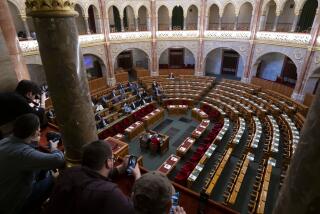Slovakia rejects bailout fund expansion in initial vote
- Share via
Reporting from London — Lawmakers in Slovakia on Tuesday rejected a proposal to beef up Europe’s bailout fund for debt-stressed nations, but supporters are hopeful that the measure will pass in a second vote expected to take place within days.
The ruling coalition of Prime Minister Iveta Radicova collapsed after failing to gather enough votes from the Slovak parliament in favor of the measure, an outcome she had warned would be tantamount to a vote of no confidence in her government.
The plan for a strengthened bailout fund, which is widely seen as imperative for Europe to tame its growing debt crisis, was torpedoed in parliament by a junior party within Radicova’s coalition. In a tense showdown after hours of impassioned debate, the libertarian Freedom and Solidarity party refused to back the measure, saying that Slovaks should not be on the hook to bail out richer but financially reckless nations such as Greece.
Only 55 lawmakers voted in favor, well short of the necessary majority of 76. Most of the rest of the 150 members of parliament abstained or were absent.
The expanded bailout fund, with a projected lending capacity of about $600 billion, requires the ratification of each of the 17 countries that share the euro currency. All but Slovakia have already given their approval.
The chief Slovak opposition party, Smer, backs the bailout fund in principle, but its leader said it would withhold support until a second vote in order to trigger the collapse of the government and force an early election in the coming weeks, which the party hopes to win.
With Radicova’s coalition toppled, Smer agreed late Tuesday to work with other politicians to hold a repeat vote quickly, most likely by week’s end, in order to minimize turmoil in global financial markets. But many investors are apt to take fright anyway over the new delay in getting the beefed-up bailout fund up and running.
The wrangling in Slovakia provided yet another example of how national politics have hindered strong collective action by Europe and undermined its credibility in the face of the most serious challenge to confront the euro. The need for unanimous approval of Eurozone states has allowed a relatively small nation of 5.5 million people to exercise a veto over a plan approved by the parliaments of 16 other countries, including heavyweights Germany and France.
Investors watched nervously throughout the day Tuesday to see how the political drama in Bratislava, the Slovak capital, would unfold. The markets and European officials had applied heavy pressure on Radicova and others in her government to fall in line and show solidarity with the rest of the Eurozone.
“It is the entire Eurozone system which is under threat at the moment, not just a few small countries anymore,” Radicova told the parliament in a final attempt to rustle up support. “Our euro is under threat. The changing situation needs a quick and immediate reaction.”
But Richard Sulik, leader of the dissident Freedom and Solidarity party, said that even in its expanded form, the bailout fund would not be capable of rescuing bigger economies such as Italy and Spain. As for Greece, the epicenter of the debt crisis, he said, it would be better to allow the debt-ridden Mediterranean nation to default rather than to prop it up with loans it might never pay back.
Last-minute talks between Radicova and Sulik broke up Tuesday morning without a compromise. The prime minister’s announcement that she would consider the parliament’s rejection of the plan a vote of no confidence in her government was dismissed by Sulik as political blackmail.
Even if both sides of the aisle in Bratislava come together to ratify the bailout fund in the next few days, many experts say, the plan already needs a major overhaul to catch up with a crisis that threatens to engulf Spain and Italy.
And there is widespread agreement that a proposed second bailout for Athens, on top of the one it received last year, will have to be modified as well to demand greater losses by private holders of Greek debt, to help bring down the overall debt load to a more manageable level.
On Tuesday, international finance inspectors announced that Greece was likely to receive its next installment of about $11 billion in emergency loans in November, which Athens says it must have if it is to keep paying its bills. Disbursal of the funds had originally been scheduled for this month, but the inspectors refused to give the green light out of frustration with the Greek government’s slow pace in shrinking the public sector and collecting taxes.
But pledges by Athens to speed up its reforms appear to have satisfied the international inspection team for now.
More to Read
Sign up for Essential California
The most important California stories and recommendations in your inbox every morning.
You may occasionally receive promotional content from the Los Angeles Times.











